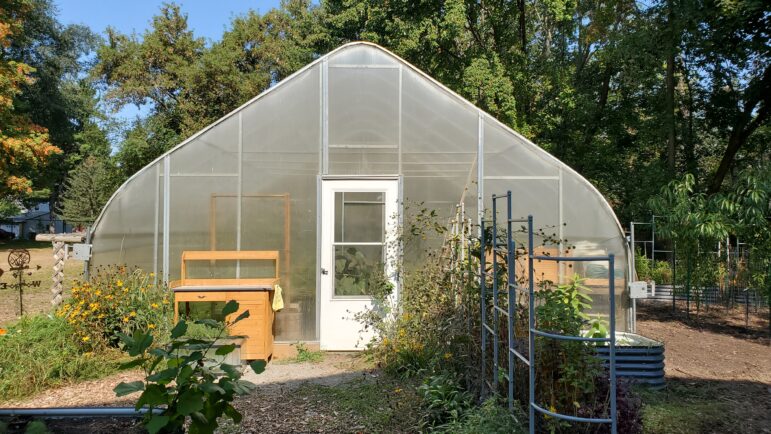A portion of the playground at Okemos Public Montessori was in dire need of renovation. Christine Batora, one of the teachers at the school, described the area as being not only “unattractive,” but unusable for children and teachers.
“When [children] are outside, they’re learning from each other by playing games and interacting, and also teachers use the outside space for outside lessons,” Batora said. “This space, in particular, just did not offer any positive learning opportunities for the children.”
So, the school applied for a Green Grant and was one of its recipients in 2022. This grant is provided by Meridian Township to various community organizations and schools to help fund green infrastructure projects.
Courtney Wisinski, a member of the township’s Board of Trustees, said that the grant program was created in recognition of the interest from organizations in the township to promote environmental sustainability.
“We [considered] putting together some funds and providing grant funds to different agencies based on their proposal, the budget,” Wisinski said. “We thought since the community wants to help us make sure we maintain this environmentally sound community, it only made sense.”
The township appropriated $10,000 for these grants for 2021 and has appropriated the same amount in the two years since.
One of the goals of the program, besides the environmental impact of the projects it funds, is educational value. John Sarver, a member of the township’s Environmental Commission, said that the educational aspect of the projects is a significant consideration in determining which grant requests are approved each year.
“There’s always been an interest in having the green grants have a strong educational component, so that, whatever the project is, the benefits and the experience can be shared within the township” Sarver said.
This educational impact is most noticeable at Montessori Radmoor School in Okemos. The school has been a recipient of the grant in all three years of the program. Davis Coye, the groundskeeper at Radmoor, said that their projects have provided students with exciting, hands-on learning opportunities about the environment and environmental protection.
The school’s projects have included adding educational signs along a nature trail that encircles the school; renovating their greenhouse and running irrigation to flowerbeds; building a dedicated area for native agricultural plants; creating a tree nursery for native trees; and replacing invasive plants and turf grass across the school’s campus with native plants and trees.

“Most of the time, the students help us plant all of these things,” Coye said. “They help a lot and that’s the point; that’s the goal. It’s to get them involved and get them understanding how they can help.”
For Doug Holem at Haslett Community Church –– which received the grant in 2022 to rebuild a pollinator garden that sits in front of their church –– the grant project also fostered a deeper sense of connection with his community.
“I think when you have a project you work on and you work together and you complete it, you’ll have some pride in what you did,” Holem said. “But somehow you assimilate a friendship as you’re doing that, and you don’t even know that you were doing that.”
At Okemos Public Montessori, Batora also found a sense of connection with the broader township community through their project. The school partnered with Michigan State University 4-H Children’s Garden and Meridian Garden Club to create a butterfly garden on their “unusable” portion of the playground.
“Just through the initiative of learning about the grant, we fell into this rabbit hole of getting closer to MSU and the children’s garden, and then also Meridian Township, and then also the Garden Club, and then also really supporting our school,” Batora said. “It [was] this small idea and it just added layers and layers of community support, and then it just became this amazing project.”
Stemming from their partnership with Meridian Garden Club and classes, students at the school have also been advocating for the black swallowtail to be named as the official state butterfly. Students have written letters to state legislators and even spoken at committee hearings, Batora said.
The bill to designate the black swallowtail as the state butterfly passed the state House this summer and is awaiting a vote in the Senate.
“So many things just kept falling in our laps in these positive ways,” Batora said. “And this has just been a wonderful piece to this, that we might have a state butterfly.”
On Sept. 19, the township Board of Trustees approved an increase in funding for the Green Grants to $20,000 as part of their annual budget for next year.
Wisinski, who also serves as the Board liaison to the Environmental Commission, said that a combination of increased interest, diversity of the grant proposals and greater community collaboration on these projects were among the primary reasons for this increase.
“The intent is to get as many people involved and provide this amount of resources for them to be able to make a difference,” Wisinski said.